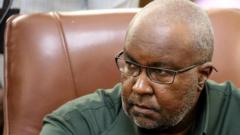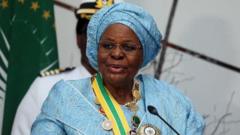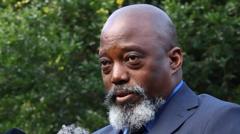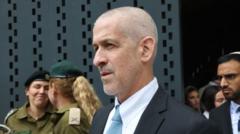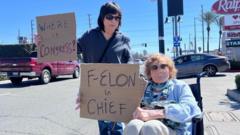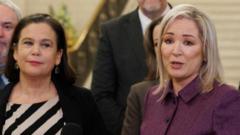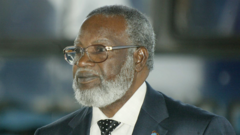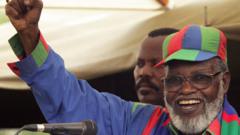In a contested electoral process, Netumbo Nandi-Ndaitwah has been declared Namibia's first female president, receiving over 57% of votes in an election marked by significant disputes. The Independent Patriots for Change party, led by her rival Panduleni Itula, has condemned the results, claiming electoral misconduct and calling for judicial action. This development comes as Swapo, the ruling party since Namibia's independence, faces growing challenges to its long-held dominance.
Namibia's Historic Election: First Female President Amid Controversy
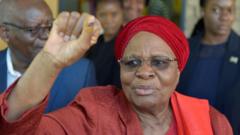
Namibia's Historic Election: First Female President Amid Controversy
Namibia has made history by electing its first female president, but the process remains clouded with allegations of electoral fraud.
Namibia's political landscape is evolving as the country navigates the challenges of democracy and leadership. The opposition's outrage could set the stage for potential reforms or added tensions in the nation's political milieu.
Namibia elected its first female leader, Netumbo Nandi-Ndaitwah, but the victory sparks backlash from opposition over alleged election fraud.
In a landmark election, Netumbo Nandi-Ndaitwah has made history by becoming Namibia's first female president, after a recently concluded poll that has sparked widespread controversy. Official results from the electoral commission indicated that Nandi-Ndaitwah, the vice-president and member of the ruling South West Africa People’s Organisation (Swapo), garnered over 57% of the vote, significantly ahead of her rival Panduleni Itula, who received around 26%.
However, the election was marred by significant logistical hurdles and a three-day extension in vote counting in certain regions, prompting Itula and the Independent Patriots for Change (IPC) to reject the results, citing fraud and malpractice. As a result, opposition parties chose to boycott the announcement of the results, leading to heightened tensions in the political atmosphere.
Following the announcement, Nandi-Ndaitwah declared that the electorate had chosen a path of peace and stability, while acknowledging the historic moment of her victory. Having worked in important government positions for over 25 years, she is a respected figure within Swapo.
Despite her electoral success, the situation reflects broader challenges facing Swapo, which has ruled since independence in 1990. Recent trends show a decline in voter support for the party, making this election pivotal. With the IPC signaling intentions to seek justice through legal means regarding the electoral process, the future of Namibia's political landscape remains uncertain as it grapples with issues of governance and democratic integrity.
Namibia elected its first female leader, Netumbo Nandi-Ndaitwah, but the victory sparks backlash from opposition over alleged election fraud.
In a landmark election, Netumbo Nandi-Ndaitwah has made history by becoming Namibia's first female president, after a recently concluded poll that has sparked widespread controversy. Official results from the electoral commission indicated that Nandi-Ndaitwah, the vice-president and member of the ruling South West Africa People’s Organisation (Swapo), garnered over 57% of the vote, significantly ahead of her rival Panduleni Itula, who received around 26%.
However, the election was marred by significant logistical hurdles and a three-day extension in vote counting in certain regions, prompting Itula and the Independent Patriots for Change (IPC) to reject the results, citing fraud and malpractice. As a result, opposition parties chose to boycott the announcement of the results, leading to heightened tensions in the political atmosphere.
Following the announcement, Nandi-Ndaitwah declared that the electorate had chosen a path of peace and stability, while acknowledging the historic moment of her victory. Having worked in important government positions for over 25 years, she is a respected figure within Swapo.
Despite her electoral success, the situation reflects broader challenges facing Swapo, which has ruled since independence in 1990. Recent trends show a decline in voter support for the party, making this election pivotal. With the IPC signaling intentions to seek justice through legal means regarding the electoral process, the future of Namibia's political landscape remains uncertain as it grapples with issues of governance and democratic integrity.

